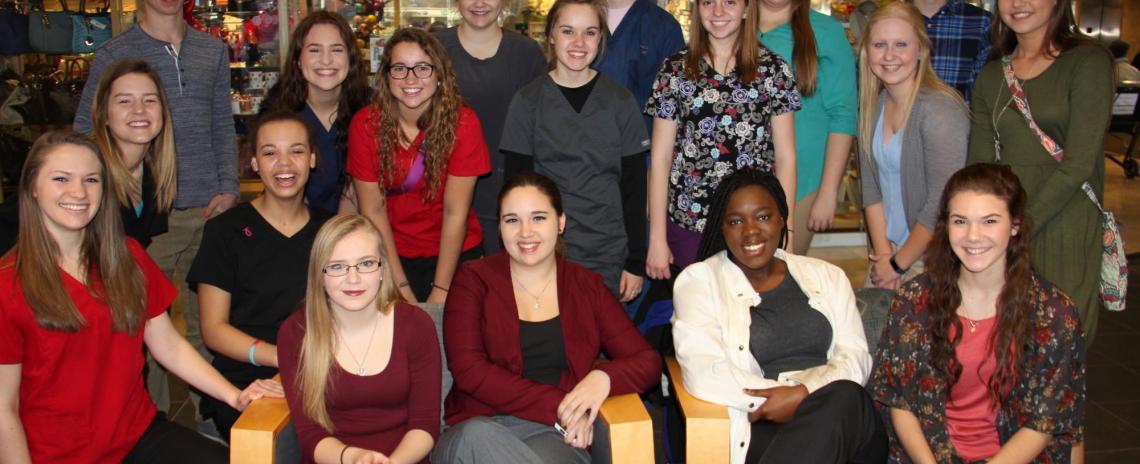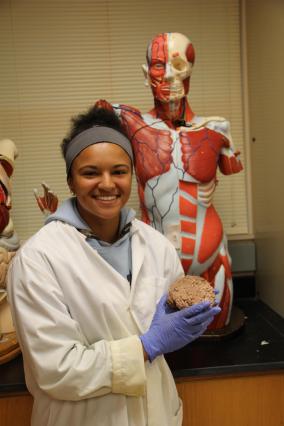Springboard to the Future: SENCAP sets students up for success
Springboard to the Future: SENCAP sets students up for success
By Tyler Dahlgren
NCSA Communications Specialist
Dr. Randy Nelson was freshly retired, a recovering former school superintendent he jokes, when he was approached with an intriguing opportunity.
This was nearly a decade ago, in 2008, and superintendents in the ESU 6 area were beginning to consider methods of combatting complacency from 12th-grade students. In other words, they were looking for a cure for “Senioritis”, a way to ensure student success beyond graduation.
“Basically, what was happening is those seniors were getting to their last year with all of their credits taken care of and just kind of floating,” Nelson said. “It was kind of their entitlement year. They were just taking the easy classes.”
The group of superintendents set their site on a program that would be of value to students in the present, as well as the future. They settled on a career academy. Not intended to be punitive, but rather beneficial for students, the academy would serve as a springboard for juniors and seniors into college and beyond.
“We wanted it to be meaningful, and we wanted to offer experiences like field trips, where they get hands-on experience and engaged learning,” Nelson said. “We wanted to provide job-shadowing opportunities. We wanted to have presenters come in so the kids could have conversations with real-world people.”
So that’s what Nelson gave them. Southeast Nebraska Career Academy Partnership (SENCAP) started in ESU 6, offering five college classes in 2008 in two academies; Health and Education. The initial enrollment in the program was 45.
Nine years later, SENCAP had 843 students from 45 southeast Nebraska schools. The program offers 10 different pathways, from agriculture to business to IT to construction, a popular addition in 2016-17.
While the program has expanded massively (there have been over 2,500 participants in the last five years), its focus remains the same.
“We give hands-on type experiences, and our whole purpose is to get kids focused on what they want to do with the rest of their lives before they get out of high school,” Nelson said.
Friend High School graduate Haley Ranae Lawver is one of many SENCAP students that speaks favorably about her experience.
“SENCAP was by far one of the most helpful high school experiences I had,” said Lawver. “It helped me decide what major was right for me, gave me a feel for what college work consisted of, and allowed me to get a head start on a career path.”
Nelson spent the year after being hired visiting other states, learning as much as he could about career academies, which were very sparse in Nebraska.
“We did some surveys to find out what the needs were as far as jobs, and that’s how we came to health and education,” Nelson said. “We developed some dual credit classes and partnered with Southeast Community College, adding more pathways and more opportunities for kids each year, like college courses, job shadowing and hands-on experiences.”
Grant money would run out after a few years, but SCC stepped up and invested in the SENCAP program, hiring Nelson and two full-time directors, plus a qualified part-time staff consisting primarily of former school administrators.
“The investment Southeast Community College has made is unlike any other community college in the state,” Nelson said. “They put a huge dollar amount into this program. They’ve made a commitment to this not only because they see the value, but they know that this is best for kids.”
SCC offers 50 percent off on student tuition, and 75 percent of the 45 schools involved with SENCAP pay the other half of tuition. A majority of SENCAP students are getting a jumpstart on their futures for free or very low costs.
“Moms and dads are liking that,” Nelson adds.
When a student graduates from high school after taking part in SENCAP, they can already have acquired 12-24 college credits. Cumulatively, those students posted a 3.04 grade point average in their college courses.
“Nebraska kids are special,” Nelson said. “They are special because of their work ethic. I can take any of these kids on a field trip and they are always ambassadors for their schools. They are great kids.”
SENCAP has five learning centers, spread throughout their 15-county service area, in addition to the three SCC campuses in Beatrice, Lincoln and Milford. The largest academy of the 10 offered is the field of health, which has over 220 kids. Education is another popular pathway. Welding has grown from 15 kids to more than 110 in just five years.
“We have companies that would hire our kids right now if they could,” Nelson said. “We had a bunch of our kids go out to Kawasaki for a field trip. They need 200 welders right now. It really gets the kids’ eyes open to what is available out there.”
The program is constantly evolving. Students evaluate their experience and Nelson’s staff is eager to take those responses and apply them to SENCAP. Construction, for example, was added this year. Criminal justice was offered for the first time last year.
“We have the best and brightest kids in our program,” Nelson said. “As schools, that is truly what we are about, preparing our kids for the future. Even beyond college. Part of that is steering them in the direction of something they are passionate about and have an interest in, and that’s what we try and do.”
One of the main goals of SENCAP is to find opportunities for students within their own communities. Nelson wants students to graduate and go back to work in their hometown, if possible.
“That’s all about economic development, and our kids love that,” he said. “They love to be a part of the culture of Nebraska.”
The culture is strong, Nelson feels, and the commitment schools show to the success of their students is one of the reasons SENCAP has been so successful.
“We’ve got great schools in Nebraska,” Nelson said. “You saw the GPA of kids taking college-level courses (3.04) and it’s a B or better, so we’ve got a lot of kids acing classes. We’ve got kids taking four or five college classes while they’re still in high school. Plus they are doing job shadowing, their activities, and they are working. It makes our state great.”
Each spring, SENCAP holds a Professional Day for each of the 10 academies. Students go through mock interviews with professionals in their focus areas, who then critique the interview and offer evaluations.
While signing up for his junior year of courses at Waverly High School, Caleb Nielsen came across a Computer Information Technology class in the SENCAP program, something he had been mildly interested in before. Little did he know a career path had just been paved.
“I would recommend the program to other students because it gives you the basic knowledge of whatever it is that he or she is looking to go into,” Nielsen who enrolled in Dakota State University as a Cyber Operations major this fall, said. “The program gives students exposure to possible professions, and it’s helpful because once they have really started to focus on their specific career, they already had exposure to it and are able to draw upon some background knowledge.
Nelson, in his 10th year of “light retirement”, is busy spreading SENCAP’s message. He is out and about all the time, talking to parent-teacher groups and schools, opening the eyes of sophomore and junior students to the opportunities in front of them.
He would love to share the model with other regions of the state.
“If other colleges would work with schools throughout the state, it’d be awesome,” he said, stressing the impact career academies can have in a student’s life. “If we are truly going to prepare out students for the workforce and college, we need to be doing it earlier.”
SENCAP is a springboard to the future for many high schoolers in the state.
If its first decade is any indicator, the future is bright.



